Global Health Special Programs
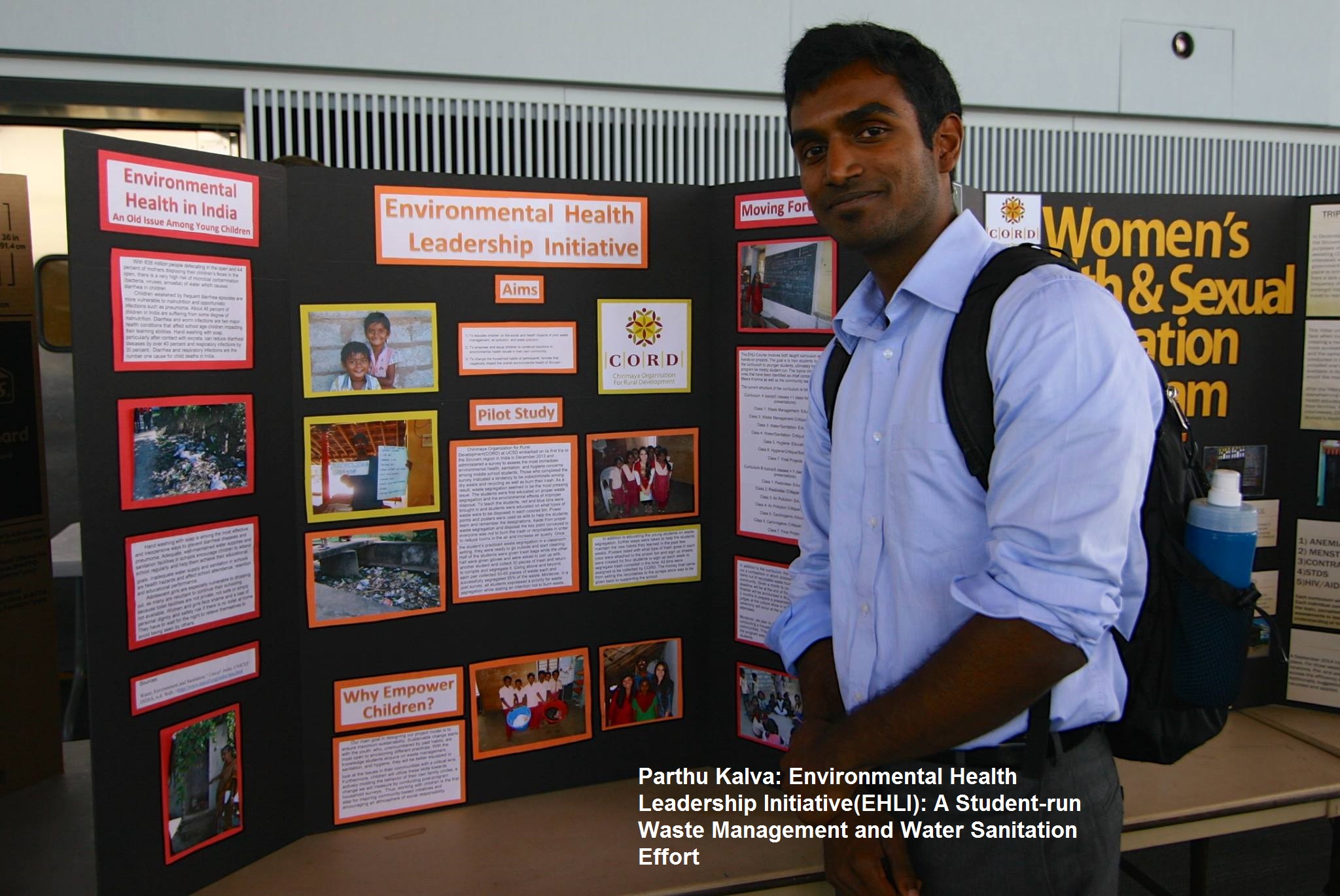
Blum Cross-Border Initiative Summer Internship
The internship is housed in the UCSD Center on Global Justice, which is focused on interdisciplinary, undergraduate, community-engaged research and training on regional poverty and its onsequences. Student from the GHP examine issues of health, illness and wellbeing at community organizations in the San Diego - Tijuana border region in collaboration with students from interdisciplinary practica on campus who have interests in environmental and urban challenges; engineering and technical problem solving; human rights and social justice; and the role of arts and culture in underserved communities. Students receive a stipend to support their participation, which fulfill the Field Experence requirement. Students who enroll in a Blum Center workshop can count this experience as elective credit toward the degree.
What do other GHP Students have
to say about their Blum Experience?
Robert She (pictured above): I was lucky enough to be one of two Global Health students to take part in an eight week summer internship for Blum Cross-Borders Initiative. As the first group of UCSD researchers to pilot the expansion of UC Berkeley’s Blum Center, we were tasked to investigate pressing issues around the dynamic border region. I was able to uncover complicated health issues and see the urgent need of public health services in two underserved communities. We also made air quality measurements in areas around the border and looked at run-off contamination. We worked as an interdisciplinary team to holistically investigate the complex web of issues in which the inaccessibility of health care is linked to urban development, legal policies, as well as political ecology. I worked with other students majoring in engineering and international studies as well as professors of visual arts, political science, and cognitive science. They allowed me to directly apply my diverse global health coursework ranging from environmental science to the history of healthcare modalities. All in all, the research project has been an experience like no other. I hope I will be able to continue my work in public health with the Blum Initiative to realize practical service projects that tackle health risks and improve health care in San Ysidro and Los Laureles.
Christian Saavedra (pictured above): The Global Health minor, now a component of the Global Health Program comes from a perspective of social concern on healing modalities, illness prevention, and health awareness. Since the minor is based on a global scale, and thus diversity, these health perspectives must be tailored to the regional interest of a particular culture. It is important for scholars to understand from this that in order to productively intervene in these health processes, those processes should be respected and seen as interdisciplinary to create the notion of global health.
Along with understanding this interdisciplinary relation of diverse health processes, several underlying factors are examined that influence health in different cultures extensively. In other words, global health can be examined from a biological perspective, in terms of nutrition, mental and physical illnesses, a cultural perspective based on healing practices, and a political perspective based on education, health care, environment, and political violence.
The first day experience on the field solidified the reasoning for including the Global Heath minor as a practicum for the BLUM Cross-Border Initiative. Some observations and statistics that heavily related to the practicum included: Increases in the population and, thus, waste production, the elevation as an environmental factor that allows rain to flow down a slope, and with few drainage systems, carry the waste it collects across canyons and homes to the border estuaries causing health problems, and the lack of utilities necessary for proper healthiness, such as water or electricity systems. Other factors that were seen along the way to the site were a presence of only a few hospitals and schools. This could correlate to lower health awareness and health care services available to the public. Still, the projects provided by Alter Terra encourage healthiness and liveliness at this site by working through the community and its government. From these observations and perspectives, the presence of the Global Health practicum gave an appropriate insight to the research study.
HFit Undergraduate Internship
The Health Frontiers in Tijuana Undergraduate Internship Program (HFiT-UIP) is a quarterly internship that affords developmental experiences in public health and healthcare for the underserved. Students accepted into this program will participate in the HFiT binational student run free clinic project located in Tijuana, Mexico, in conjunction with medical and pharmacy students from the University of California San Diego and Universidad Autonoma de Baja California. Upon completion of the HFiT-UIP, students will have learned about biomedical and social factors associated with communicable and non-communicable diseases seen among vulnerable populations in the San Diego-Tijuana region, shadowed clinical faculty during consultation, and been involved in ongoing UCSD research projects at the HFiT clinic.
The HFiT-UIP is only open to Global Health Majors and Minors. Two quarters of the internship program can be used to fulfill the 100 hour field experience requirement.
Please see the attached syllabus and http://meded.ucsd.edu/index.cfm/groups/hfit/students/undergraduate_students/ for more information. Additional information may be found here as well.http://globalhealth.ucsd.edu/resources/spotlights/Pages/StudentSpotlight.aspx
To apply for the HFiT-UIP, please review the and fill out the application and return it to Daniel Yee.
Gun Violence Intervention Group
Gun violence is a social and cultural behavior, yet it behaves as if it were a pathogenic illness. It is transmitted like a pathogen and plays into the cycle of American structural violence. The United States may not be beleaguered by Tuberculosis or Malaria, but gun violence has become the epidemic of the American twenty-first century. Through weekly meetings, excursions and outreach, this group aims to bring students together to create an open, multi-disciplinary and informational forum to find meaningful and realistic ways to address the gun violence epidemic in the United States.
Faculty Advisor: Janis Jenkins, Ph.D (jhjenkins@ucsd.edu)
Members of the 2013-2014 Group Presenting at the UCSD Global Health Conference
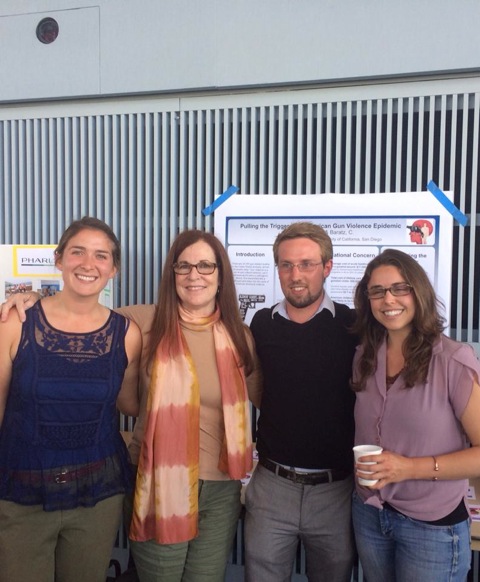
Getting a lesson from a former County Sheriff on the importance of Gun Safety and Handling
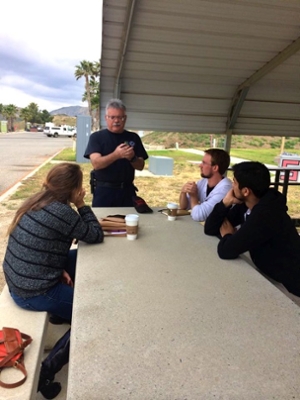
TJ Carr, a San Diego high school teacher, speaks at the screening of the Interrupters in May 2014
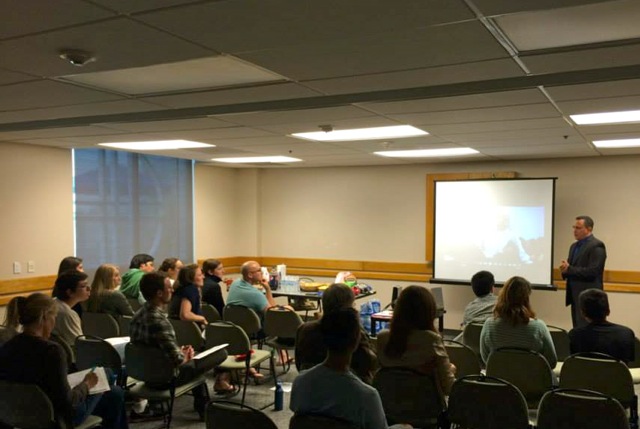
Joe Anderson and Caroline Baratz presenting at the UCSD Global Health Conference
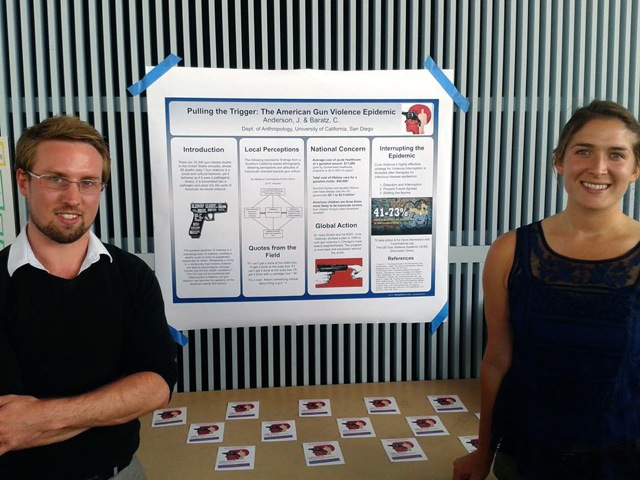
Ali Duerkson demonstrating proper Gun Safety and Handling technique
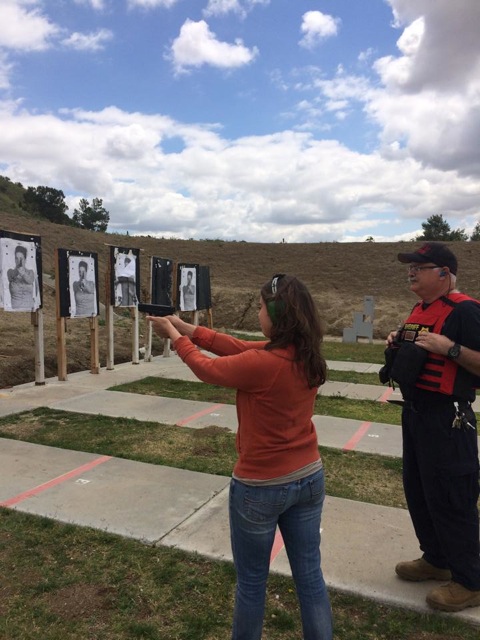
Global Seminars: REV 160GS & 165 GS - Public Health in Amman
Please visit the PAO site for more information on this course.
The International Center will be offering the following courses for Summer 2015.
REV 160GS & 165 GS fulfills the Epidemiology Course Requirement for the Global Health Major. These courses are only offered in summer.
Mexican Migration Field Research Program (MMFRP)
Global Health majors and minors can participate in an in-depth, hands-on research experience through the Mexican Migration Field Research Program (MMFRP). To participate in the program, students enroll in the upper-division sequence of elective courses LATI 122A/B/C. They work closely with faculty who are responsible for teaching the courses, guiding the students’ research and writing, and supervising the teams’ fieldwork in Mexico and the U.S. Scholarships are available to cover travel and other expenses during fieldwork. LATI 122A/B/C can be petitioned to count as part of the Global Health Field Experience Requirement.
For detailed information about the program’s conditions and requirements, interested students should seek orientation from the Latin American studies student affairs coordinator. They can also visit the website of the Mexican Migration Field Research Program athttp://ccis.ucsd.edu/programs/mmfrp.
The UCDC Program
UCDC is an academic program that provides students of all majors an opportunity to continue their studies while interning in Washington, DC. Internships, relevant to each major, form the backbone of this program. The availability of a 4-unit research seminar that satisfies upper-division course requirements for a number of majors. UCDC is also a residential program with apartments at the centrally-located, UC Washington Center. Not only does this facilitate relocating temporarily to the nation's capital, the Center offers students a rich exposure to the Washington community through tours and an evening speaker series. Since the program's inception in 1997, over 1,000 students have included UCDC in their educational experience at UC San Diego.
To learn more or apply for the UCDC Program visit AIP for more information.
There are many opoortunities that can be used to fulfill the Global Health Field Experience Requirement. These can be found on AIP's list of Washingotn DC internships in the Health and Medical field.
